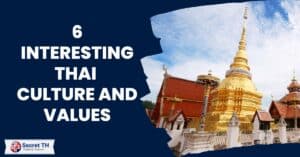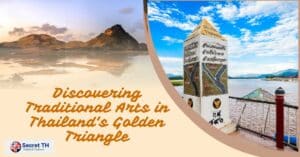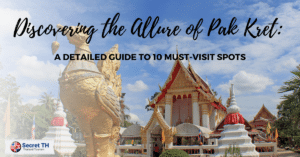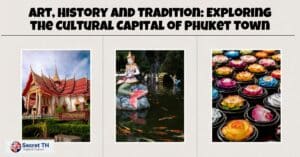Thailand, with its rich cultural heritage and deep-rooted Buddhist traditions, offers a sanctuary for those seeking peace and inner tranquility. The country’s vibrant temples, known as wats, and serene meditation retreats provide profound experiences, allowing visitors to immerse themselves in Thai Buddhist practices and find solace amidst the chaos of modern life. In this article, we will explore the essence of tradition and tranquility by delving into the world of Thai Buddhist temples and meditation retreats.
This blog post will guide you through the serene world of Thai Buddhist temples and meditation retreats. Join us as we embark on this enlightening journey, immersing ourselves in the rich tapestry of Thai Buddhism, fostering inner peace, and discovering a new perspective on life.
I. Thai Buddhist Temples: A Glimpse into Sacred Spaces
Thai Buddhist temples are not merely architectural marvels. They also serve as spiritual havens where visitors can witness the harmonious fusion of art, religion, and culture. Stepping into a wat, one is immediately greeted by the sight of intricately adorned statues. Elaborate murals depicting Buddhist stories, and the gentle aroma of incense. Each wat possesses its unique character, reflecting diverse influences from various historical periods. Let’s explore two revered temples, Wat Phra Kaew in Bangkok and Wat Phra That Doi Suthep in Chiang Mai. And, gain insight into Thailand’s spiritual heritage.
1. Wat Phra Kaew: The Jewel of Bangkok
Situated within the grounds of the Grand Palace in Bangkok, Wat Phra Kaew, also known as the Temple of the Emerald Buddha, stands as one of Thailand’s most revered temples. This sacred site houses the meticulously carved Emerald Buddha statue, which dates back to the 14th century. The temple’s stunning architecture, adorned with intricate details and shimmering mosaics, creates an awe-inspiring ambiance. Exploring Wat Phra Kaew allows visitors to immerse themselves in the spiritual essence of Thai Buddhism and marvel at the country’s artistic prowess.
Address: QF2V+M34, Na Phra Lan Rd, Khwaeng Phra Borom Maha Ratchawang, Khet Phra Nakhon, Krung Thep Maha Nakhon 10200, Thailand
For pictures, booking, and more information, click here.

2. Wat Phra That Doi Suthep: A Spiritual Retreat in Chiang Mai
Perched atop Doi Suthep mountain in Chiang Mai, Wat Phra That Doi Suthep offers not only breathtaking panoramic views but also a tranquil refuge for spiritual seekers. Legend has it that the temple enshrines relics of the Buddha, making it a significant pilgrimage site. Ascending the 309 steps leading to the temple is an integral part of the experience, symbolizing the journey toward enlightenment. The intricate architecture, serene courtyards, and meditation halls make Wat Phra That Doi Suthep a captivating destination for introspection and connection with Buddhist teachings.
Address: Suthep, Mueang Chiang Mai District, Chiang Mai 50200, Thailand
For pictures, booking, and more information, click here.

II. The Power of Meditation Retreats
Meditation has long been a cornerstone of Buddhism, and Thailand offers a myriad of retreats where individuals can learn and practice this ancient art. These retreats provide a supportive environment for participants, regardless of their experience level, to deepen their practice and cultivate mindfulness. Often set in serene locations such as lush forests, mountains, or secluded monasteries, these retreats allow individuals to disconnect from the noise of daily life and embark on a journey of self-discovery.
Types of Meditation Retreats
Thailand’s meditation retreats offer a range of techniques and approaches to suit different individuals. Some retreats focus on Vipassana meditation, emphasizing insight and awareness of the present moment. Others may offer Metta (loving-kindness) meditation, cultivating compassion and goodwill towards oneself and others. Walking meditation, where practitioners engage in mindful walking, is another popular practice offered in retreats. These varied approaches provide participants with the opportunity to explore different meditation styles and discover the ones that resonate with them the most.
Benefits of Meditation Retreats
Participating in a meditation retreat can have profound effects on one’s physical, mental, and emotional well-being. By dedicating uninterrupted time to meditation practice, individuals can experience deep relaxation, reduced stress levels, and improved clarity of mind. Retreats often include periods of silence, allowing participants to fully immerse themselves in self-reflection and cultivate inner peace. The guidance of experienced teachers and the supportive community of fellow practitioners further enhance the transformative nature of these retreats.

III. Monastic Life: Nurturing the Soul
For those seeking a more immersive experience of Buddhist traditions, monastic life offers a transformative journey. In Thailand, individuals have the opportunity to temporarily ordain as monks or nuns, living within monastic communities and adhering to strict disciplines and rituals. This immersion allows individuals to detach from worldly concerns, focus on spiritual development, and gain a deeper understanding of Buddhist teachings. Interacting with experienced monastics and fellow practitioners provides invaluable insights into the practice of compassion, humility, and self-reflection.
Benefits of Monastic Life
Temporarily ordaining as a monk or nun in Thailand provides a unique opportunity to delve into the heart of Buddhist practice. Monastic life fosters discipline, simplicity, and a deep sense of mindfulness. Through engaging in daily monastic routines, which include meditation, chanting, and acts of service, individuals can cultivate inner peace, gain clarity, and develop a greater understanding of the impermanence and interconnectedness of all things.
Requirements and Experiences
Temporarily ordaining in Thailand typically requires contacting a monastery in advance and following specific guidelines set by the monastic community. Men ordain as monks, while women ordain as nuns. During the ordination period, individuals shave their heads, don monastic robes, and participate in communal activities alongside experienced monastics. This immersive experience provides a profound sense of unity and allows individuals to witness firsthand the dedication, devotion, and spiritual depth of monastic life.

IV. Festivals and Rituals: Celebrating Thai Buddhism
Thai Buddhist festivals and rituals form an integral part of the country’s cultural and spiritual fabric. These vibrant celebrations provide a colorful glimpse into Thailand’s spiritual tapestry and offer visitors a chance to experience the warmth, joy, and sense of community that define Thai culture.
1. Songkran: Thai New Year Festival
Songkran, the Thai New Year, is the country’s most significant festival, celebrated annually from April 13th to 15th. This water festival is known for its exuberant water fights, symbolizing the washing away of past misfortunes and the welcoming of a fresh start. Songkran is also a time for families to gather, pay respects to elders, and participate in religious ceremonies, such as pouring scented water on Buddha images as an act of cleansing and purification.
2. Loy Krathong: Festival of Lights
Loy Krathong, typically held in November, is a magical festival that celebrates the beauty of water and light. Thousands of intricately crafted krathongs, small floating vessels made of banana leaves, are released into rivers, lakes, and other bodies of water. These krathongs carry candles, incense, and flowers, creating a stunning spectacle as they float away. The festival signifies the act of letting go of negative emotions, expressing gratitude, and seeking blessings for the future.
For pictures and more information, click here.

Conclusion
Thai Buddhist temples and meditation retreats offer a unique opportunity to embrace tradition, find tranquility, and embark on a transformative journey. By immersing ourselves in the sacred spaces of Thai temples. Exploring meditation retreats in serene environments, and engaging with the rich heritage and teachings of Buddhism. We can cultivate inner peace and gain a deeper understanding of ourselves and the world around us. Thailand, with its spiritual havens, vibrant festivals, and profound rituals. It continues to inspire seekers from all walks of life to find solace











